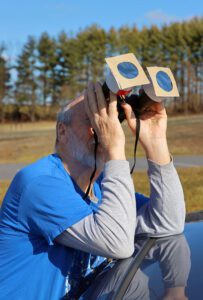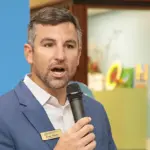compiled by Amanda Milewski, photography by Nikola Tzenov
Westminster Astronomical Society Celebrates Its 40th Anniversary
The Westminster Astronomical Society, Inc. (WASI) will celebrate four decades of fostering local interest in astronomy at Carroll County Astronomy Day on Saturday, April 13, at Bear Branch Nature Center at 4 p.m. The event is free and open to the public and will be held rain or shine. Attendees will enjoy telescope and astronomy demonstrations and tours of the observatory, and will even be able to view the sun through the telescopes and, after dark, the night sky. The event will include raffles of at least two telescopes. For more information, visit WestminsterAstro.org.
Still Looking Up
Did you know that Carroll County — most known for its rolling farmland and agrarian heritage — is also known for its dark skies? For members of the Westminster Astronomical Society Inc. (WASI), the county’s dark skies are critical in providing easier viewing of the night sky.
Dark skies are areas devoid of light pollution from densely populated areas. Although there are most certainly places with darker skies, the county offers a good option for those who commute to Baltimore or the District of Columbia for work.
Such was the case for WASI founding member Curtis Roelle, who grew up and attended college in Nebraska. He moved to Montgomery County, Maryland, and worked in the defense and space technologies industries in the District. After two years, he moved to Westminster “in search of darker, less ‘light-polluted’ skies,” he explained.
Here, he could further develop his childhood hobby, which had included “watching launches of the Mercury astronauts leading up to and including the moon landings,” he recalled.
Roelle joined the National Capital Astronomers (NCA), headquartered in Washington. After moving to Westminster, he sought another club option closer to home. Unfortunately, there were no other clubs nearby.
In 1984, Roelle presented a lecture at the Westminster branch of Carroll County Public Library about an upcoming eclipse and safe viewing techniques. At the same time, he was contemplating the idea of a local astronomy club. He and four other founding members began meeting at his house until the Physics Department at Western Maryland College (now McDaniel College) let them hold meetings in their office. And, just like a protostar, the WASI was born.
WASI’s membership exploded within a couple of years due to the interest in the reappearance of Halley’s comet in 1986, Roelle noted. “After COVID-19, we started hosting our meetings on Zoom, and membership declined,” he said. “Now that in-person meetings have resumed, our membership is approaching 100 again.”
Those meetings occur monthly on the second Wednesday at the Bear Branch Nature Center at the Hashawha Environmental Center in Westminster. The meetings feature talks on different topics with experts from well-known area institutions like the Johns Hopkins University Applied Physics Laboratory, Goddard Space Flight Center, and the Space Telescope Science Institute, to name a few.
Wayne “Skip” Bird, WASI’s outreach director, recounted that John Mather, Nobel Prize winner in physics and senior project scientist for the James Webb Space Telescope, spoke at a WASI meeting, the result of a chance meeting between Bird and him on a street corner in Baltimore.
Bird said that the subjects of the monthly talks are understandable to everyone; you don’t need a scientific or astronomical background to comprehend the information presented.
Also, every month, and in cooperation with the Carroll County Department of Recreation & Parks, WASI volunteers present guided tours of the night sky at the planetarium at Bear Branch Nature Center. The planetarium was renovated in 2013, is now fully digital and has seats for 29 visitors.
WASI’s centerpiece is the Blaine F. Roelke Memorial Observatory on Hashawha’s grounds. The telescope (a Celestron 14-inch Schmidt-Cassegrain) and 3-meter diameter Ash dome were donated by founding member Blaine Roelke; the structure that houses them was funded by Carroll County government.
The telescope helps individuals observe the planets and deep-sky objects like galaxies and nebulae.
Additional WASI events — public star parties, group activities and special events like eclipse viewings — also occur at the Charlotte’s Quest (Pine) Observatory at the Charlotte’s Quest Nature Center in Manchester and Soldiers Delight Natural Environmental Area in Owings Mills.
Bird, who joined WASI in 1991, has been outreach director for more than 20 years. His involvement in the organization was a matter of being in the right place at the right time. He recounted that on the day he and his wife moved into their house near Piney Run Park, his wife pointed out that people with telescopes had gathered in the park. He eventually wandered down to check out the star party, and this encounter began his decades-long connection with the group.
Regarding outreach, “WASI is one of the top five clubs in the United States,” Bird said. “We sponsor more than 30 events every six months,” he continued.

Those events will include two significant milestones this year.
The first is a total solar eclipse on Monday, April 8. Bird and the club’s eclipse ambassadors are busy educating the public about safely viewing this rare event and planning eclipse viewing parties. The next total solar eclipse, according to Bird, won’t take place until 2045.
“This (2024) eclipse will be an even bigger opportunity for viewing than the one in 2017,” Bird explained. Despite parts of the country only being able to see a partial eclipse because of its north-south path, this astronomical event has the potential to be viewed by a more expansive audience — by the millions — of U.S. residents.
Also, this year, WASI is celebrating its 40th anniversary: “Still Looking Up” is its anniversary logo tagline. Plans for anniversary celebrations are in the works.
“As with any organization, there is a continuous turnover of members,” Roelle affirmed. “Yet although the faces have changed, the enthusiasm that new members bring with them has not abated. I hope that the membership level remains strong and that our members enjoy a balance between continued public outreach plus their own enrichment in the hobby of amateur astronomy,” he said.
WASI is a 501(c)(3) nonprofit organization and relies on donations and membership dues for funding. Family or single-individual memberships are $25 per year, and youth memberships (for those younger than 18) are $5 per year. In addition to the meetings and events, members can borrow one of the club’s six loaner telescopes for personal viewing or any publication from the WASI’s extensive library collection. Planetarium shows begin at 7:30 p.m. The entry fee is $5, and guests must register to attend.To learn more about membership information, planetarium shows, upcoming WASI events and details if your business or organization is interested in an eclipse-viewing presentation, visit WASI’s website at WestminsterAstro.org or follow WASI on Facebook.











